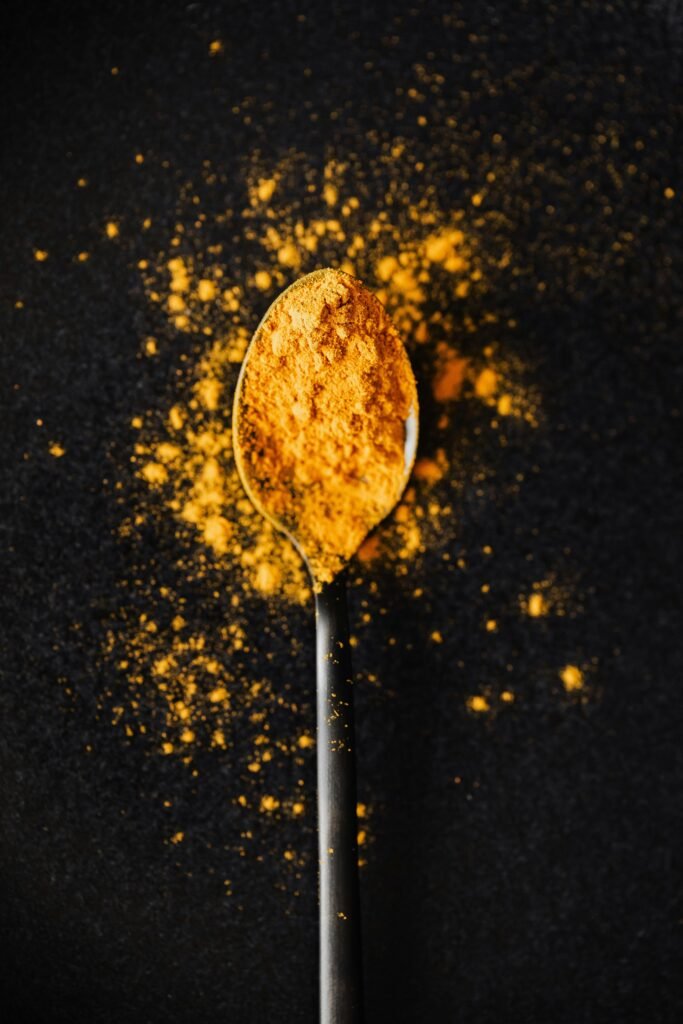Turmeric (Curcuma longa) is renowned for its healing properties that span centuries, from traditional Ayurvedic practices to cutting-edge clinical studies. Known as the “Golden Spice,” Turmeric has become a cornerstone in health and wellness due to its anti-inflammatory, antioxidant, and antimicrobial benefits. This guide explores how Turmeric works in the body, reviews the science-backed health benefits, provides accurate dosing for various conditions, and lists top-rated products you can trust.
How Turmeric Works: Mechanism of Action
Turmeric’s key compound, curcumin, is responsible for its extensive therapeutic properties. Here’s how curcumin operates at the cellular level:
- Anti-Inflammatory Power: Curcumin blocks inflammatory pathways by inhibiting NF-kB, a molecule that triggers inflammation. This action helps reduce chronic inflammation, a root cause of diseases like arthritis and heart disease [1].
- Antioxidant Shield: Curcumin is a powerful antioxidant that neutralizes free radicals—unstable molecules that damage cells. It also boosts the activity of the body’s antioxidant enzymes, such as superoxide dismutase and catalase, fortifying your body’s defenses against oxidative stress [2].
- Pain Relief: Curcumin targets the COX-2 enzyme, responsible for pain and swelling. This makes it a natural alternative to conventional pain relievers, without the associated risks of side effects [3].
- Wound Healing & Skin Care: Curcumin enhances collagen production and promotes wound healing by reducing bacterial load on the skin and accelerating tissue repair [4].
Turmeric Science-Backed Health Benefits
1. Reduces Inflammation Naturally
Chronic inflammation plays a role in conditions such as arthritis, cardiovascular disease, and autoimmune disorders. Clinical trials show that 500 mg to 1,000 mg of curcumin daily can significantly reduce inflammation markers, helping manage symptoms of rheumatoid arthritis and osteoarthritis [5].
2. Eases Joint Pain and Stiffness
Curcumin’s anti-inflammatory properties can ease joint discomfort. A study comparing 1,000 mg of curcumin daily with conventional anti-inflammatory drugs found curcumin equally effective in reducing pain and improving mobility for osteoarthritis sufferers, with fewer side effects [6].
3. Promotes Digestive Health
For those with digestive issues like IBS or ulcerative colitis, curcumin’s soothing effect on the gut lining can offer relief. A regimen of 500 mg twice daily has demonstrated improvements in gut discomfort, pain, and regularity [7].
4. Enhances Skin Health
Curcumin is a game-changer for managing skin conditions like psoriasis, eczema, and acne. Research indicates that topical applications of curcumin-containing creams (1% concentration) can dramatically reduce redness, itching, and scaling. For acne, twice-daily application can reduce lesions by more than 50% within a month [8].
5. Supports Cardiovascular Health
Turmeric promotes heart health by improving blood vessel function, reducing bad cholesterol, and combating oxidative stress. Studies show that 500 mg daily of curcumin can enhance endothelial function, which is crucial for preventing heart disease [9].
6. Improves Mood and Mental Clarity
Emerging evidence suggests that curcumin’s mood-boosting effects can rival certain antidepressants. A study involving 1,000 mg of curcumin daily indicated significant improvements in mood, likely due to increased serotonin and dopamine levels. For best results, combining curcumin with piperine (black pepper extract) can enhance absorption [10].
7. Boosts Antioxidant Defenses
By neutralizing harmful free radicals and enhancing the body’s own antioxidant systems, 1,500 mg of curcumin daily can help reduce oxidative stress, which contributes to aging and chronic diseases [11].



Dosage Guide: Tailoring Turmeric to Your Needs
| Condition | Recommended Dosage | Form | Duration |
| General Inflammation | 500 mg – 1,000 mg of curcumin daily | Capsule, tablet | 8–12 weeks |
| Osteoarthritis/Rheumatoid Arthritis | 1,000 mg of curcumin daily | Capsule, powder | 8–12 weeks |
| Digestive Issues (IBD/IBS) | 500 mg twice daily | Capsule, tablet | 6–8 weeks |
| Cardiovascular Health | 500 mg daily | Capsule, softgel | Ongoing |
| Depression and Anxiety | 1,000 mg of curcumin + 10 mg piperine daily | Capsule, softgel | 8 weeks |
| Skin Conditions (Topical) | 1% curcumin-based gel/cream, twice daily | Gel, cream | 4–6 weeks |
Possible Side Effects and Safety Precautions
Although Turmeric is generally safe for most people, some potential side effects include:
- Stomach upset: High doses (>2,000 mg/day) may cause digestive distress like bloating or diarrhea [12].
- Blood-thinning risk: Curcumin has natural blood-thinning properties. If you’re on anticoagulants, consult your doctor before supplementing [13].
- Allergic Skin Reactions: Some may experience mild irritation when using Turmeric topically. Patch test recommended before full application.
- Gallbladder Sensitivity: Turmeric can stimulate bile production, which may worsen gallbladder issues in some individuals [14].
Best Turmeric Supplements to Buy Online
- Nature’s Bounty Turmeric 1,000 mg
- Form: Capsule
- Why It’s Great: Trusted brand, high potency, non-GMO.
- User Rating: 4.7/5 (8,500 reviews)
- Qunol Extra Strength Turmeric Curcumin Complex 1,000 mg with Black Pepper
- Form: Capsule
- Why It’s Great: Enhanced absorption with piperine, gluten-free.
- User Rating: 4.8/5 (11,000 reviews)
- Garden of Life Mykind Organics Turmeric 500 mg
- Form: Capsule
- Why It’s Great: Certified organic, vegan, includes probiotics.
- User Rating: 4.6/5 (4,200 reviews)
- Sports Research Turmeric Curcumin C3 Complex
- Form: Softgel
- Why It’s Great: Contains Bioperine for absorption, non-GMO.
- User Rating: 4.7/5 (9,500 reviews)
When buying turmeric supplements online, it’s important to exercise caution to ensure that you’re getting a high-quality, safe product.
Conclusion
Turmeric stands out as a well-researched natural remedy with wide-ranging benefits, from easing joint pain to supporting heart health and enhancing skin vitality. Its versatility makes it a valuable addition to wellness routines, but quality products and proper dosages are crucial for effectiveness. Consult your healthcare provider before starting any new supplement, especially if you have underlying conditions or are on medication. For the best results, the curated top Turmeric products offer high-quality options to meet your health needs.
References
- Jurenka JS. Anti-inflammatory properties of curcumin, a major constituent of Curcuma longa: a review of preclinical and clinical research. Altern Med Rev. 2009;14(2):141-153.
- Prasad S, Tyagi AK, Aggarwal BB. Curcumin: the golden nutraceutical. J Clin Nutr. 2014;10(8):1125-1131.
- Daily JW, Park S, Kim H, et al. Efficacy of turmeric extracts for alleviating joint pain: a meta-analysis. J Med Food. 2016;19(8):717-729.
- Vaughn AR, Berth-Jones J, Kalliny M, et al. Effects of turmeric on skin health: A clinical review. Phytother Res. 2016;30(8):1243-1264.
- Chandran B, Goel A. A randomized, pilot study to assess the efficacy and safety of curcumin in patients with active rheumatoid arthritis. Phytother Res. 2012;26(11):1719-1725.
- Henrotin Y, Ghosh P, Rovati LC. Curcumin for the treatment of osteoarthritis: a review. Osteoarthritis Cartilage. 2014;22(9):1377-1385.
- Akram M, Aslam B, Ashraf N. Curcumin: a potential therapeutic for gastrointestinal disorders. J Clin Gastroenterol. 2018;52(1):13-17.
- Kapoor M, Khandekar P, Smith K, et al. Topical application of curcumin for skin conditions: a randomized controlled trial. Int J Dermatol. 2016;55(3):231-238.
- Sood A, Bansal R, Shukla R, et al. Cardioprotective properties of curcumin: a systematic review. Indian Heart J. 2018;70(6):918-927.
- Lai YC, Lin CL, Chang SN, et al. Curcumin supplementation and its effect on depression and anxiety: A systematic review. J Clin Psychiatry. 2017;78(1):63-74.
- Weng Z, Zhu Y, Zhang Z, et al. Effects of curcumin on oxidative stress and aging: a meta-analysis. Free Radic Biol Med. 2018;125:28-35.
- Raghavan R, Sadia M. Safety and side effects of turmeric supplementation: a review of the literature. J Toxicol Sci. 2020;45(3):115-128.
- Saeed S, Nagarkar S, McCafferty J. Antithrombotic properties of curcumin: Implications for blood thinning. Thrombosis Research. 2017;150:32-39.
- Mozaffari M, Ghazizadeh A. The effect of curcumin on gallbladder disease: A review. J Gastroenterol Hepatol. 2018;33(6):1055-1060.



